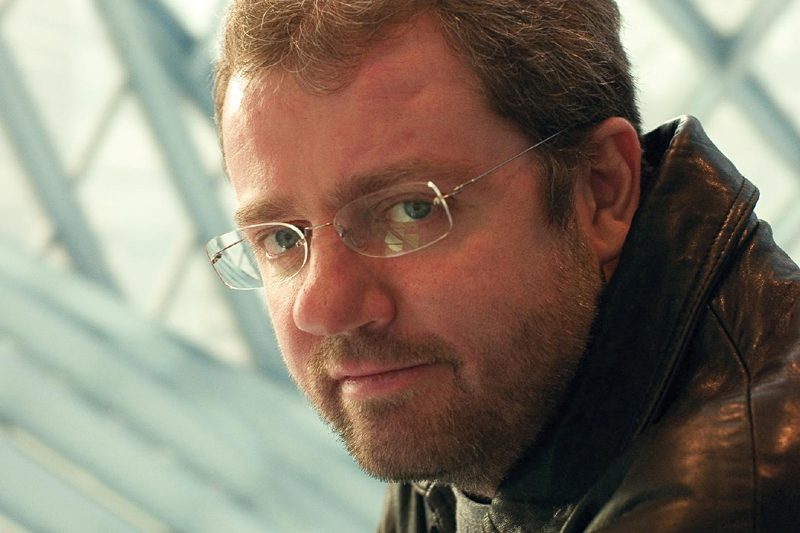Matt Ruff was woken early in his adopted city by urgent calls from his hometown, New York, on the morning of 9/11. As news reports gradually filled in details about the al-Qaida attacks, he remembers, “We stayed in front of the TV all day.” The planes, the planning, the simple scheme that inflicted so much damage—who could believe it? It was like some kind of dream, or a movie. When his friend and fellow novelist Neal Stephenson (The Baroque Cycle) subsequently told him “We’re out of a job,” Ruff’s response was “No, we’re not.” But how to find a fresh angle on such a fantastical terrorist tale? Let the opportunists and exploiters take the first swings in fiction, he decided.
Rather than address 9/11 immediately, Ruff embraced “the virtues of waiting,” he says. “The first impulse isn’t the most thoughtful one. I’m, like, ‘Wait a while.’ ” So during the next decade, he finished two novels, 2003’s Set This House in Order and 2007’s Bad Monkeys—and it was the latter that led to a Hollywood invite to pitch some TV ideas, as he explained over a recent cup of coffee.
His idea was for a multiseason series that “was very close to what the novel ended up being,” says Ruff. It would be an alternate-history spin on 9/11, in which the rich, developed, civilized part of the world is the United Arab States (or UAS). In this universe, the UAS won World War II. Israel is located in partitioned northern Germany. The Twin Towers are in Baghdad. And America is a backward, violent, religiously divided land, with various chunks of the continent ruled by warring Mormons, Pentecostals, etc.
And it is from America that Christian fundamentalist terrorists (or “crusaders”) strike on November 9, 2001 in the mirror-reversed world of The Mirage (Harper, $25.99), whose main events take place a decade after those attacks. In response to the 11/9 attacks, the UAS invades America as part of the War on Terror, and the Green Zone is in occupied Washington, D.C. The “good guys” are a trio of brave Arab Homeland Security agents—think Jack Bauer, only Muslim—who seek to prevent suicide bombers from America and Europe. (“Why do they hate us?” one character wonders.)
It was a pretty audacious pitch back in 2006, as Ruff concedes: “Reversing 9/11, that scared a lot of people. This is somewhat sacred territory still.” Moreover, his outline for a TV series would’ve spanned several continents and involved dozens of characters—some with recognizable names (more on that below). Here’s where we discuss influences, since, as the soft-spoken Ruff explains, “I’m a big pop-culture head—sci-fi and The Wire . . . and books by Richard Price. I’m kind of a Tom Clancy fan. I’m also a big Philip K. Dick fan. I do tend to be drawn to more risky ideas . . . going into uncomfortable places.”
As a TV series, The Mirage would’ve done exactly that, asking us to reverse our sympathies from the accepted us-and-them of terrorism. It also would’ve involved huge quantities of historical backstory to explain how this alternate world came to be—for instance, Lyndon Johnson is a Baptist dictator who ruled the Christian States of America from 1963 to 2003! “It’s as if Oliver Stone’s theories had been real,” Ruff chuckles.
To compress all that information into a novel, Ruff employs Wikipedia-like entries relating how, for example, Saddam Hussein is very much alive, a Baghdad gangster who trades information for historical artifacts (some smuggled from America). Osama bin Laden is a powerful UAS senator with a secret agenda. And across the Atlantic, Donald Rumsfeld and Dick Cheney are up to some familiar intrigues. This alt-historical framework is in many ways the best and most entertaining part of the book, and you want it to expand beyond the mere 400 pages of The Mirage, whose final resolution is less satisfying. Even if it had been a TV series, it might’ve suffered from the same Lost-style letdown. Beginnings are often easier than endings.
In a way, as we talk TV shows, Ruff considers The Mirage a post-Lost kind of novel. Before that series, with its burrowing complexity, byzantine plotting, and magical elements, readers (or viewers) might not have swallowed Ruff’s historical rewrite. And within the big reversal, his three agents begin to discover other clouds and deceptions. In this way, too, The Mirage benefits from an X-Files effect, the sense that “the real explanation is something even wilder” than what Ruff’s protagonists first consider. “I love those kinds of conspiracy theories,” says the author. “I’m perfectly happy not to know all the answers, but I want to believe there could be one. They’re out there.”
Ruff describes himself as a minister’s son with “a lot of experience with how people suspend their disbelief.” That has translated nicely into fiction, since the Queens native sold his first novel straight out of Cornell, and has been writing novels ever since. He and his wife, rare-books dealer Lisa Gold, moved to Seattle in 2000—after rejecting Portland, ha!—because “we wanted a place with four seasons,” says Ruff. Since he and his wife had portable careers, “We were able to go anywhere we wanted.” They currently live in the Ballard-Phinney neighborhood, where Ruff’s writing routine is undisturbed by kids or even cats. After holing up for many solitary months on The Mirage, he says, “I’m still getting the hang of speaking to other people.”
Might there yet be a TV series or sequel to The Mirage? It would be awfully tempting to set a second volume over in primitive, strife-filled America, where cannibals allegedly inhabit the Rockies. No, according to Ruff: “I’ve said what I have to say.”








